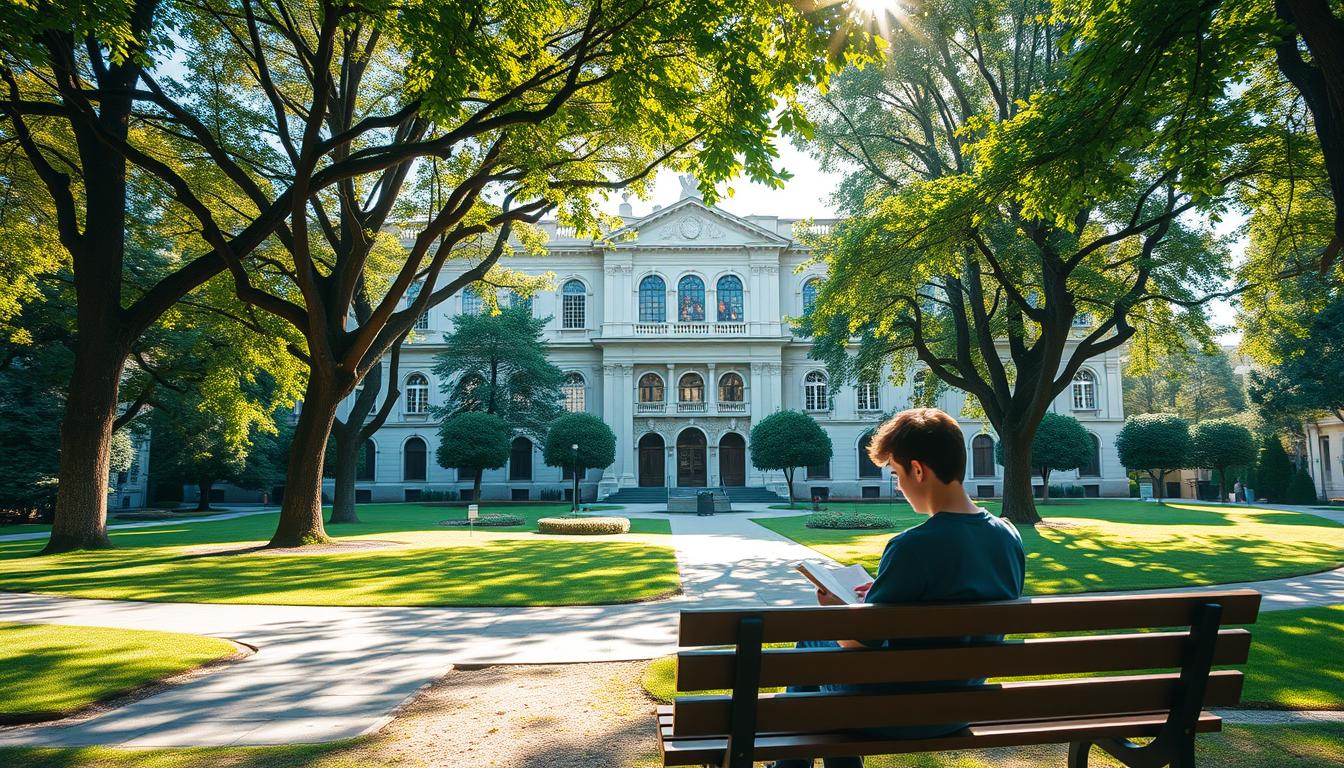Pursuing higher education overseas can open doors to world-class learning experiences.
Anúncios
For South African students, study abroad options like those in New Zealand offer academic excellence and cultural diversity. Many institutions, including Victoria University of Wellington and the University of Auckland, provide financial support for international students.
Understanding the application process is key. Government-funded programs and university-specific awards vary in requirements. Real success stories, like Laura Schnelle from Germany at the University of Canterbury, show the impact of these opportunities.
Anúncios
This guide simplifies the steps to secure financial aid. From eligibility checks to submission deadlines, it covers essential details for a smooth application journey.
For more information, explore the official scholarship website mentioned in this article:
You will be redirected to another website
Introduction to New Zealand Scholarships
Financial aid programs make international education more accessible. For learners from South Africa, these opportunities reduce barriers to world-class institutions. Universities New Zealand oversees 100+ awards funded by trusts and private donors, supporting both undergraduate and postgraduate studies.
These programs prioritize academic excellence and skill development. Recipients gain more than tuition coverage—many awards include living allowances. This holistic support lets students focus fully on their goals.
“Scholarships don’t just fund education; they invest in future leaders.”
Notable options like the Manaaki Scholarship and Prime Minister’s Scholarships offer specialized support. The Generosity New Zealand platform simplifies discovery, with 78% of awards open to international applicants.
| Scholarship | Coverage | Eligibility |
|---|---|---|
| Manaaki | Tuition + stipend | Pacific & African students |
| Prime Minister’s | Short-term study | Global applicants |
For South Africans, these opportunities align with career aspirations. Whether pursuing STEM or humanities, financial aid ensures talent thrives.
Types of New Zealand Scholarships
Global learners have multiple funding options for academic pursuits abroad. These awards cater to bachelor’s, master’s, and PhD candidates across disciplines. Understanding the differences helps applicants target the right opportunities.
Government-Funded Scholarships
The NZAID program covers full tuition, travel, and living costs. Applications close annually on 28 February. This initiative prioritizes students from developing nations, including South Africa.
Eligible fields range from environmental science to public health. Recipients often commit to contributing skills in their home countries post-graduation.
University-Specific Scholarships
Victoria University of Wellington offers trimester-based deadlines (1 May and 1 August 2025). Awards focus on research excellence and leadership potential.
The University of Auckland provides rolling application windows. Their grants support underrepresented groups in STEM and creative arts.
Private and Industry Scholarships
Lincoln University partners with agribusinesses for innovation awards. These target sustainable farming and food security research.
Asian Development Bank funds are available for Asian-Pacific students. Private trusts often require separate applications via institutional portals.
| Type | Example | Key Benefit |
|---|---|---|
| Government | NZAID | Full tuition + stipend |
| University | Victoria University of Wellington | Research grants |
| Private | Lincoln Agritech Awards | Industry networking |
Eligibility Criteria for New Zealand Scholarships
Understanding qualification requirements helps applicants focus on suitable funding opportunities. Institutions assess candidates based on academic merit, residency status, and supplementary criteria. International students must review these benchmarks early to avoid last-minute hurdles.
Academic Requirements
Most programs require a minimum GPA, often 3.5/4.0 for postgraduate applicants. Undergraduate awards may accept slightly lower scores but prioritize extracurricular achievements. Competitive programs, like those for PhD candidates, often demand a detailed research proposal.
| Institution Level | Minimum GPA | Notes |
|---|---|---|
| Undergraduate | 3.0/4.0 | Leadership roles may compensate |
| Postgraduate | 3.5/4.0 | Research experience preferred |
| PhD | 3.7/4.0 | Proposal + publications required |
Nationality and Residency Conditions
South African students often benefit from country-specific quotas in government-funded programs. Language proficiency tests like IELTS (minimum 6.5) are mandatory for non-native speakers. Some awards prioritize applicants from Pacific or Māori backgrounds.
Additional Eligibility Factors
Universities New Zealand mandates separate online registration for applications. Certain scholarships require proof of community service or industry partnerships. For international students, visa status may influence award eligibility.
“Thorough preparation doubles your chances of meeting eligibility benchmarks.”
Top Universities Offering Scholarships in New Zealand
Several prestigious institutions provide generous funding for international learners. These schools combine academic rigor with tailored aid programs, easing the financial burden for master’s and PhD candidates.
Victoria University of Wellington
Applications for Trimester 2 and 3 (2025) close on 1 May and 1 August. The university prioritizes research excellence, offering grants across 150+ disciplines.
Notable options include the Wellington Doctoral Award, covering tuition and a $29,500 annual stipend. South African students often qualify for equity-based top-ups.
University of Auckland
Postgraduate diploma seekers must apply by 23 October 2025. The Innovation in Education Fund supports tech-driven projects with awards up to $15,000.
- STEM-focused grants require a 3.7 GPA minimum.
- Creative arts applicants submit portfolios via SlideRoom.
University of Otago
Rolling admissions cater to medical research aspirants. The Dean’s Scholarship waives 50% of tuition for PhD candidates publishing in Q1 journals.
Lincoln University
Sustainable agriculture master’s programs have a 1 November deadline. Partnered awards with Fonterra include paid internships.
| Institution | Key Deadline | Focus Area |
|---|---|---|
| Victoria University | 1 May 2025 | Doctoral research |
| Auckland | 23 Oct 2025 | Postgraduate diplomas |
| Otago | Rolling | Medical sciences |
“Our funding transforms potential into groundbreaking research.”
How to Apply for New Zealand Scholarships
Securing financial aid for overseas education requires a strategic approach. Each step, from research to submission, impacts the outcome. Following a structured plan ensures no critical detail is overlooked.
Step 1: Research and Shortlist Scholarships
Begin by exploring options on the Universities New Zealand portal. Government-funded programs often have earlier deadlines than university-specific awards. Focus on opportunities matching your academic level and field.
For example, the Manaaki Scholarship prioritizes Pacific and African candidates. Review eligibility criteria carefully to avoid wasted effort.
Step 2: Prepare Required Documents
Gather these essentials:
- Notarized academic transcripts
- A purpose statement (500–1,000 words)
- Reference letters using institutional templates
Some awards request additional materials, like research proposals or portfolios. Allocate time for translations if documents aren’t in English.
“Strong applications showcase both achievement and potential. Tailor each submission to the award’s mission.”
Step 3: Submit Your Application Online
Most submissions occur through institutional portals or the national platform. Double-check for platform-specific requirements, like file formats or word limits.
Track progress using university portal features. Save confirmation emails as proof of submission.
Step 4: Follow Up and Await Results
Shortlisted candidates may face interviews. Prepare by reviewing common questions about your goals and the award’s values.
After acceptance, coordinate visa timelines promptly. Delays can impact enrollment.
Key Deadlines for New Zealand Scholarships
Meeting application deadlines is crucial for securing financial aid. Institutions follow strict timelines, and late submissions are rarely considered. South African applicants must account for timezone differences when planning.
Fixed deadlines like NZAID’s 28 February cutoff for 2025 leave no room for delays. Rolling deadlines, such as the University of Waikato’s, offer flexibility but prioritize early applicants.
Institution-Specific Timelines
- Lincoln University: Master’s programs close 1 November and 1 April annually.
- University of Auckland: Postgraduate diplomas require submissions by 23 October 2025.
- NZAID: Strict 28 February deadline for government-funded awards.
| Institution | Deadline | Notes |
|---|---|---|
| University of Waikato | Rolling | Early applications encouraged |
| Lincoln University | 1 Nov/1 Apr | Master’s programs only |
| NZAID | 28 Feb 2025 | No exceptions |
Postgraduate cycles often align with research terms, while undergraduate deadlines match academic semesters. Medical emergencies may warrant exceptions, but documentation is mandatory.
“A well-planned timeline separates successful applicants from missed opportunities.”
South African students should set reminders for local time conversions. Submitting a day early avoids last-minute technical issues.
Tips for a Successful Scholarship Application
Standing out in a competitive applicant pool requires strategic preparation. With Universities New Zealand processing 15,000+ applications annually, attention to detail makes the difference. These proven tactics help international students craft compelling submissions.
Writing a Strong Personal Statement
Laura Schnelle’s award-winning framework emphasizes storytelling. She connected her environmental study goals to New Zealand’s sustainability initiatives. Keep these elements in mind:
- Clarity: Outline career objectives in the first paragraph.
- Relevance: Align experiences with the scholarship’s mission.
- Authenticity: Avoid generic phrases; share specific challenges overcome.
Securing Strong Recommendation Letters
Hendrik Schultz’s PhD application succeeded partly due to tailored references. Professors highlighted his lab research and problem-solving skills. Follow these protocols:
- Request letters 6–8 weeks before deadlines.
- Provide recommenders with your CV and award criteria.
- South African applicants must notarize academic records first.
“Applications showcasing measurable impact—like community projects or published research—rank 37% higher in evaluations.”
Meeting All Submission Requirements
Creative arts portfolios often require SlideRoom uploads in specific formats. Technical errors like incomplete PDFs account for 22% of rejections. Double-check:
- File naming conventions (e.g., “LastName_PurposeStatement.pdf”)
- Word limits for essays (strictly enforced)
- Portal submission confirmations
Conclusion
Finalizing applications with precision avoids common pitfalls in the selection process. Cross-check documents, deadlines, and formatting to ensure a polished submission. The Generosity New Zealand database, accessible through university libraries, helps verify requirements.
For direct support, contact the Universities New Zealand team via their official portal. South African applicants should explore regional partnerships, which often offer additional funding avenues.
Remember to budget for living costs (averaging NZ$20,000/year) alongside tuition. Use course search tools to align programs with career goals and study abroad opportunities.
FAQ
What types of financial aid are available for international students?
Students can apply for government-funded, university-specific, or private grants. Each has unique benefits and requirements.
How competitive are awards at Victoria University of Wellington?
The selection process is highly competitive, focusing on academic excellence, leadership, and research potential.
Can postgraduate candidates receive funding for doctoral studies?
Yes, many institutions offer full or partial support for PhD candidates, including tuition coverage and living stipends.
What documents are typically required during submission?
Most programs request transcripts, recommendation letters, a personal statement, and proof of language proficiency.
When should applicants start preparing their materials?
Ideally, begin six months before deadlines to ensure strong essays and secured references.
Are there specific grants for students from developing nations?
Several initiatives target underrepresented regions, offering full tuition and travel allowances.
How important are recommendation letters in the evaluation process?
Strong endorsements from professors or employers significantly strengthen candidacy by validating achievements.
What strategies improve chances of selection?
Tailoring applications to each program’s goals and demonstrating clear career objectives enhances success rates.






